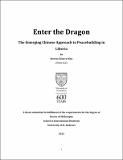Files in this item
Enter the dragon : the emerging Chinese approach to peacebuilding in Liberia
Item metadata
| dc.contributor.advisor | Taylor, Ian | |
| dc.contributor.author | Kuo, Steven Chiun-Yi | |
| dc.coverage.spatial | 299 | en_US |
| dc.date.accessioned | 2013-06-26T13:53:59Z | |
| dc.date.available | 2013-06-26T13:53:59Z | |
| dc.date.issued | 2013 | |
| dc.identifier.uri | https://hdl.handle.net/10023/3816 | |
| dc.description.abstract | Critics of the liberal peace point out that the imposition of liberal democratic structures of governance through United Nations Peacekeeping Operations has not led to a sustainable peace being built. In reply, supporters of the liberal peace argue that even though the liberal peace is imperfect, there are no better alternatives. The objective of this thesis is to examine the Chinese approach to peacebuilding and explore the possibility that it may be a potential alternative to the liberal peace. The thesis examines the Chinese understanding of the causes of insecurity in Africa, what the Chinese position is with regards to United Nations peacekeeping and peacebuilding missions in Africa; and what role China see itself playing vis-à-vis United Nations Peacekeeping Operations in Africa. The Chinese approach to peacebuilding recognises poverty alleviation as the foundation upon which sustainable peace can be built in post-conflict countries. Beijing does not believe the external imposition of a political ruling superstructure can succeed, and sees the liberal peace as neo-colonialism and liberal hubris. However, there is no set Chinese model of peacebuilding which can replace the liberal peace, or which African countries might follow. This is because the Chinese developmental model respects the local context, is based on pragmatism, and relies on trial and error to find the way forward. The Chinese have been keeping a low profile in the United Nations Mission in Liberia (UNMIL) and have focused on providing transportation and logistical support to UNMIL. The Chinese focus on infrastructure rehabilitation is appreciated by Liberians and is making a positive contribution to the life of ordinary people. On the deep societal divide that lies at the heart of the Liberian civil war and continues to cause instability, both the Chinese approach to peacebuilding and the liberal peace remain silent. | en_US |
| dc.language.iso | en | en_US |
| dc.publisher | University of St Andrews | |
| dc.rights | Creative Commons Attribution-NonCommercial-NoDerivs 3.0 Unported | |
| dc.rights.uri | http://creativecommons.org/licenses/by-nc-nd/3.0/ | |
| dc.subject | Chinese foreign policy | en_US |
| dc.subject | Liberal peace | en_US |
| dc.subject | African politics | en_US |
| dc.subject | Peace and conflict studies | en_US |
| dc.subject | Liberia | en_US |
| dc.subject | United Nations Mission in Liberia | en_US |
| dc.subject.lcc | JZ5584.A35K8 | |
| dc.subject.lcsh | Peace-building--Africa | en_US |
| dc.subject.lcsh | Peace-building, Chinese--Liberia | en_US |
| dc.subject.lcsh | China--Foreign relations--Africa | en_US |
| dc.title | Enter the dragon : the emerging Chinese approach to peacebuilding in Liberia | en_US |
| dc.type | Thesis | en_US |
| dc.contributor.sponsor | National Research Foundation (South Africa) | en_US |
| dc.contributor.sponsor | Allen and Nesta Ferguson Charitable Trust Scholarship for Sub-Saharan Africa Peace Studies | en_US |
| dc.contributor.sponsor | Oppenheimer Memorial Trust | en_US |
| dc.type.qualificationlevel | Doctoral | en_US |
| dc.type.qualificationname | PhD Doctor of Philosophy | en_US |
| dc.publisher.institution | The University of St Andrews | en_US |
This item appears in the following Collection(s)
Except where otherwise noted within the work, this item's licence for re-use is described as Creative Commons Attribution-NonCommercial-NoDerivs 3.0 Unported
Items in the St Andrews Research Repository are protected by copyright, with all rights reserved, unless otherwise indicated.


